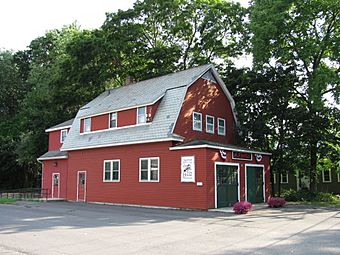Agawam Center Historic District facts for kids
Quick facts for kids |
|
|
Agawam Center Historic District
|
|

Agawam Historical and Fire House Museum
|
|
| Location | Agawam, Massachusetts |
|---|---|
| Architect | Coolidge & Carlson; Paul B. Johnson |
| Architectural style | Georgian, Federal |
| NRHP reference No. | 01000670 |
| Added to NRHP | June 21, 2001 |
The Agawam Center Historic District is a special area in Agawam, Massachusetts. It's like a time capsule, keeping important old buildings safe. This district covers many buildings along Elm Street and Main Street, especially where they meet. Most of the buildings are homes, but there are also shops, factories, and town buildings. They all sit nicely in a line, making the area look neat and connected.
Contents
What is a Historic District?
A historic district is a part of a town or city that has many old buildings or sites. These places are important because they show us what life was like a long time ago. Protecting them helps us learn about history and keep our heritage alive. The Agawam Center Historic District was added to the National Register of Historic Places in 2001. This means it's officially recognized as a special historical place in the United States.
The History of Agawam Center
The center of Agawam started to grow way back in the early 1700s. By 1750, this area was a busy stop for travelers. It was on one of the main roads connecting Northampton to Hartford, Connecticut. Imagine people stopping here to rest during long journeys!
How the Town Center Grew
In the 1790s, the main road was made even better. More private homes began to appear next to the taverns (old inns where people could eat and sleep). Elm Street also became an important connection to areas east and west. By 1831, Agawam Center had churches, a school, and even a cemetery. The oldest building still standing today is a tavern from 1750. There are also about twelve houses that were built in the 1790s.
Agawam in the 1800s
As the 1800s went on, the village kept growing. But it still felt a bit like the countryside, with not too many big factories. Later, streetcars (like old-fashioned trolleys) connected Agawam to the city of Springfield. This made the village feel more like a suburb, a quieter area near a big city. Agawam officially became its own town in 1855. Around this time, the center became the main spot for town activities and government.
Architectural Styles in the District
The Agawam Center Historic District shows off many different building styles. You can see:
- Georgian style: This style was popular in the 1700s. Buildings are often very balanced and grand.
- Federal style: Popular in the late 1700s and early 1800s, this style is a bit lighter and more decorative than Georgian.
- Mid-20th century ranch housing: These are more modern, single-story homes built around the middle of the 1900s.
Looking at these different styles helps us see how building trends changed over hundreds of years!
 | Dorothy Vaughan |
 | Charles Henry Turner |
 | Hildrus Poindexter |
 | Henry Cecil McBay |



